The African Visionary Fund – a pooled funder with support from King Baudouin Foundation’s U.S. arm, Segal Family Foundation, Skoll Foundation, and Tawingo Fund – launched in early 2020, almost simultaneously with the start of the pandemic. At a time when foundations and philanthropists were surveying the crisis ahead and earmarking emergency grants for everything from face masks to food banks, the African Visionary Fund was calmly proceeding with its founding mission: helping big, international funders overcome the barriers to donating to African-led organisations.
Just over a year on, it has disbursed $1 million to six nonprofits and established a model of co-leadership that brings together the on-the-ground experience of Atti Worku, founder of the Ethiopian nonprofit Seeds of Africa, and Katie Bunten-Wamaru, former Director of Strategy at the Segal Foundation. Though they’ve already accomplished a lot, Worku and Bunten-Wamaru stressed that their real potential lies ahead – they hope to see the African Visionary Fund disburse $10 million to 35 African-led organisations and also fundraise for another Fund that will look beyond nonprofits.
I caught up with them in late May – Bunten-Wamaru logging onto our call from Boston and Worku joining from Addis Ababa – to chat about the methodology of the Fund, why a model of Co-Leadership works, and what they hope international aid can learn from their project.
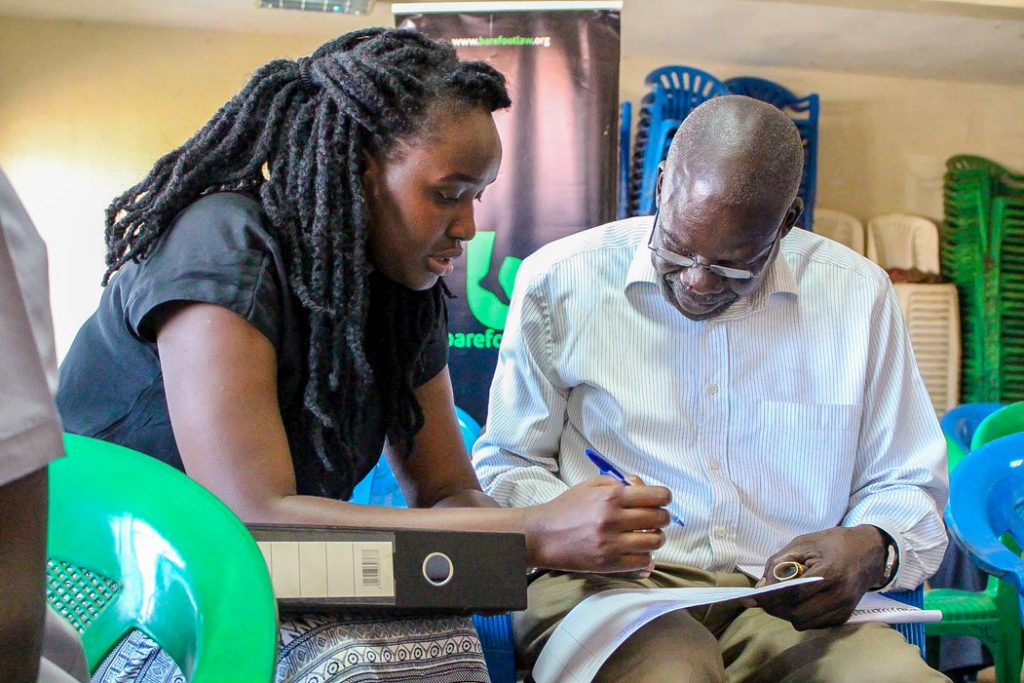
Image credit: African Visionary Fund partner BarefootLaw
On finding and funding visionaries
The first thing to notice about the African Visionary Fund is that it is called the African Visionary Fund. This was a very intentional language choice, both told me.
‘The idea of choosing visionary was that these organisations are the organisations of the future,’ said Bunten-Wamaru.
The Fund makes a point to seek out African-led organisations, working to correct the inequities of who receives funding on the continent – worldwide, more than 99 per cent of humanitarian and philanthropic funding goes to predominantly white-led international NGOs.
Every time I speak to a partner, I feel their pain. I really, personally do feel their pain, because I’ve gone through it and it’s something that I processed and thought about for many years.
‘Global giving to Africa needs its own Black Lives Matter reckoning,’ read the headline of a piece Bunten-Wamaru co-authored in The Guardian earlier this year, which cited the statistic that only five per cent of U.S. foundation giving to Africa goes to African-led organisations.
‘The future of development is not what we’ve been doing,’ Bunten-Wamaru said. ‘The future of development is not top down, it’s not Global North led. It’s so clear where this sector is going, and where it needs to go, and what is going to be the most sustainable.’
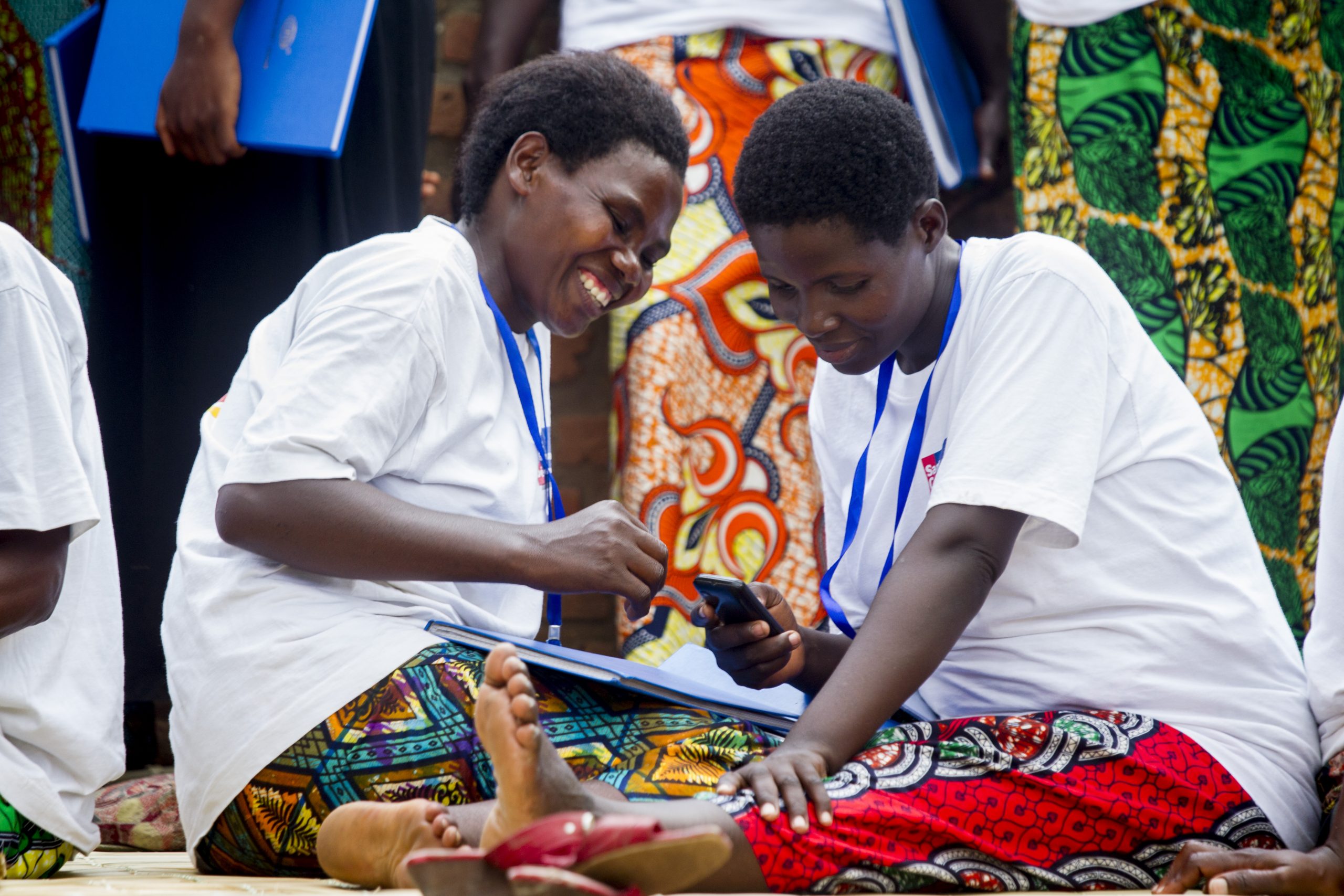
Image credit: African Visionary Fund partner SaCoDé
Tackling funding barriers was baked in from the start
The idea for the African Visionary Fund began at the Segal Family Foundation, an American foundation focusing its work on funding Sub-Saharan African communities. The foundation was founded by businessman Barry Segal 2004 and focused on aid in Africa three years later after Segal visited Rwanda and was inspired to fund rural development and community organisations.

Katie Bunten-Wamary, Co-CEO African Visionary Fund
In 2017 – ten years after that visit to Rwanda – the Foundation launched the African Visionary Fellowship. Bunten-Wamaru was working at Segal at this time, performing a sort of matchmaking service for the funding project by trying to help Western foundations find African-led organisations to fund. But they kept coming up against different barriers.
‘I kept running into these walls with funders. They would say: “I get it, I understand that locally-led organisations are more sustainable, they’re able to navigate local contexts, they understand the problems they’re addressing more deeply and with more nuance than outsider-led organisations. But I can only fund organisations that have a 501(c)(3)”. Or “I’m a funder who does really large grants and African-led organisations’ budgets are too small”. Or “I don’t have a team on the ground to find and vet and manage relationships with African-led organisations”’ Bunten-Wamaru said.
The organisations we fund are the experts in the work they do and should have the freedom to use the funds in areas they believe are important. When funds are restricted, the money ends up being spent in areas that the funder thinks are important.
But in addition to the structural barriers, there was also deep bias holding them back.
‘There was this perception amongst funders of African-led organisations that was very disconnected from reality. I think funders see African-led organisations as small and unsophisticated. They have all of these assumptions about capacity and the level of innovation. Especially back in 2017 when we were first starting to do advocacy work around this, it was like we said “African-led organisations” and funders assumed they couldn’t fund innovative work if they were funding African leaders. Which is just incredibly biased and racist.’
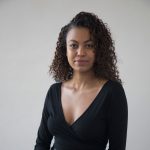
Atti Worku, Co-CEO African Visionary Fund
Worku, who for many years was an overlooked African leader of a nonprofit that was looking for funding, said: ‘Those barriers were there for me – where my competence, my intelligence, my ability to innovate was always judged because of what I looked like. It was very hard for people to believe that I, someone who was born and raised in Ethiopia and did most of my schooling here, could actually do these things. Prior to joining the fund, I had done a lot of work in advocacy and just talking about why that was problematic.’
Seeds of Africa, the nonprofit Worku founded in 2008, is an Ethiopian grassroots organisation dedicated to developing the educational foundation for the next generation of African leaders. While Worku was there, Seeds grew from an afterschool programme serving 15 kids to a full-time multi-dimensional school impacting 2,000 people. Despite this proven success, she found it hard to attract the kind of support that her white peers could.
‘Between years five and ten, when we were trying to grow it was very difficult. I thought that I was failing because I just couldn’t find funding for growth. In the beginning, I thought “oh, we have to change this thing, we have to change our pitch, we have to change how we’re defining our programs etc”, and then eventually I realised that we ticked all the right boxes, so it really was frustrating.
‘That’s when it clicked that the odds were stacked against me as an African leader, compared to Western-led organisations that were doing similar work – organisations that I know of that started around the same time were raising millions of dollars, and I couldn’t make a million. It was very clear that this was a systemic problem.’
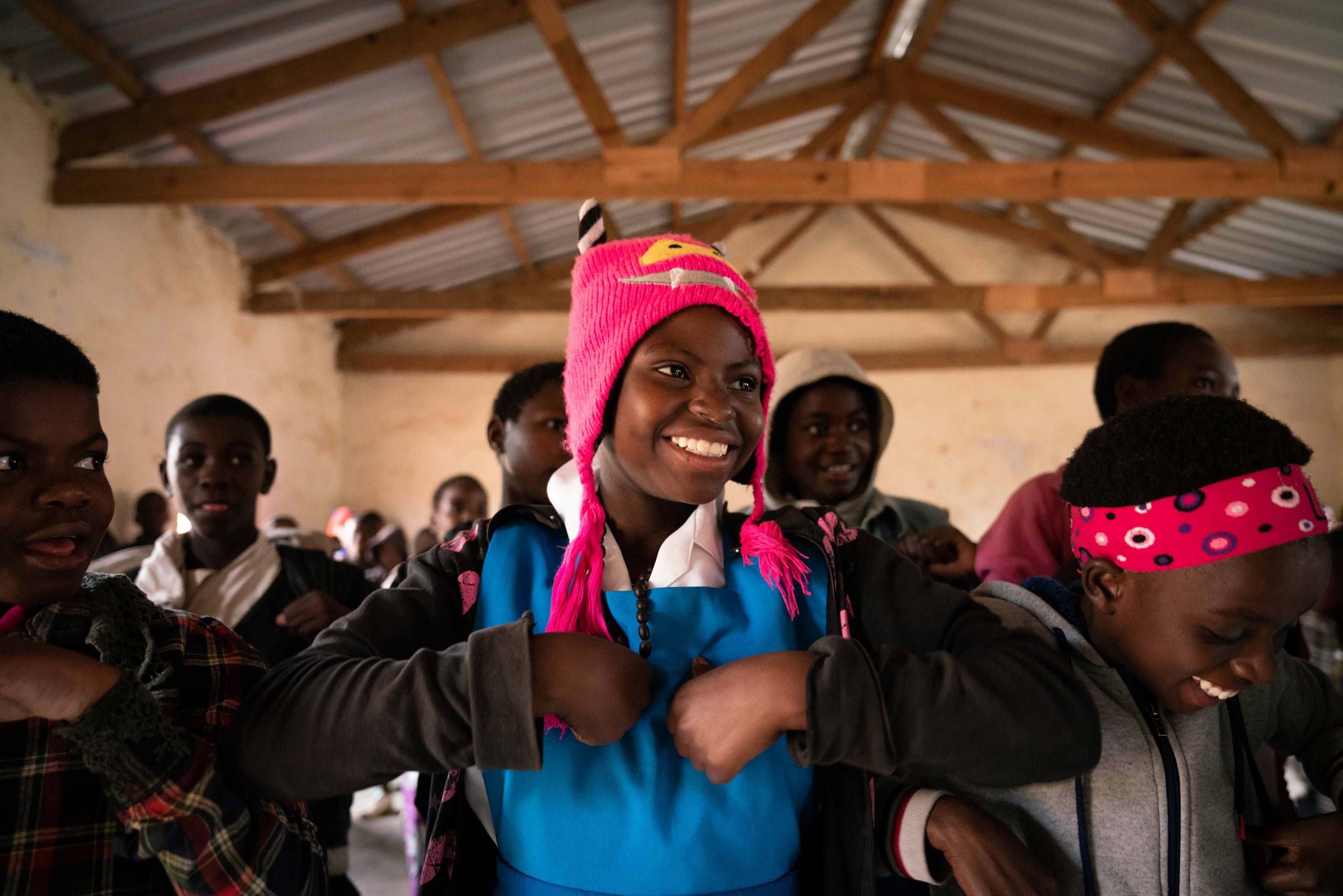
Image credit: African Visionary Fund partner Rays of Hope
A ‘play the game, change the game’ model
From the start, the goal of the African Visionary Fund has been to redistribute power. Every grant the Fund disburses is unrestricted. These grants go to grassroots groups, the ones that much of international funding overlooks. And within the organisation, the Fund has adopted a model of co-leadership with Bunten-Wamaru and Worku both taking roles as co-CEO.
‘It’s been a great way to systemise equity,’ Worku said. ‘We often hear funders talking about wanting to be equitable, but when the rubber meets the road it’s not implemented that way.’
It’s also about proximity, both said. Worku is based in Ethiopia, she worked for over a decade as the founder of a non-profit, she has the sort of local access that Bunten-Wamaru doesn’t.
There was this perception amongst funders of African-led organisations that was very disconnected from reality. They have all of these assumptions about capacity and the level of innovation, which is just incredibly biased and racist.
‘Every time I speak to a partner, I feel their pain. I really, personally do feel their pain, because I’ve gone through it and it’s something that I processed and thought about for many years,’ Worku said.
But on the other side, Bunten-Wamaru has a background in institutional philanthropy. She’s a white, American woman who lives on the East Coast. When trying to fundraise from big, American foundations, Bunten-Wamaru leans on the, in her words, ‘undue trust and the benefit of the doubt’ she gets for her background.
‘While we take advantage of that,’ Bunten-Wamaru said, it is important for the Fund that ‘I am not the sole decision-maker.’
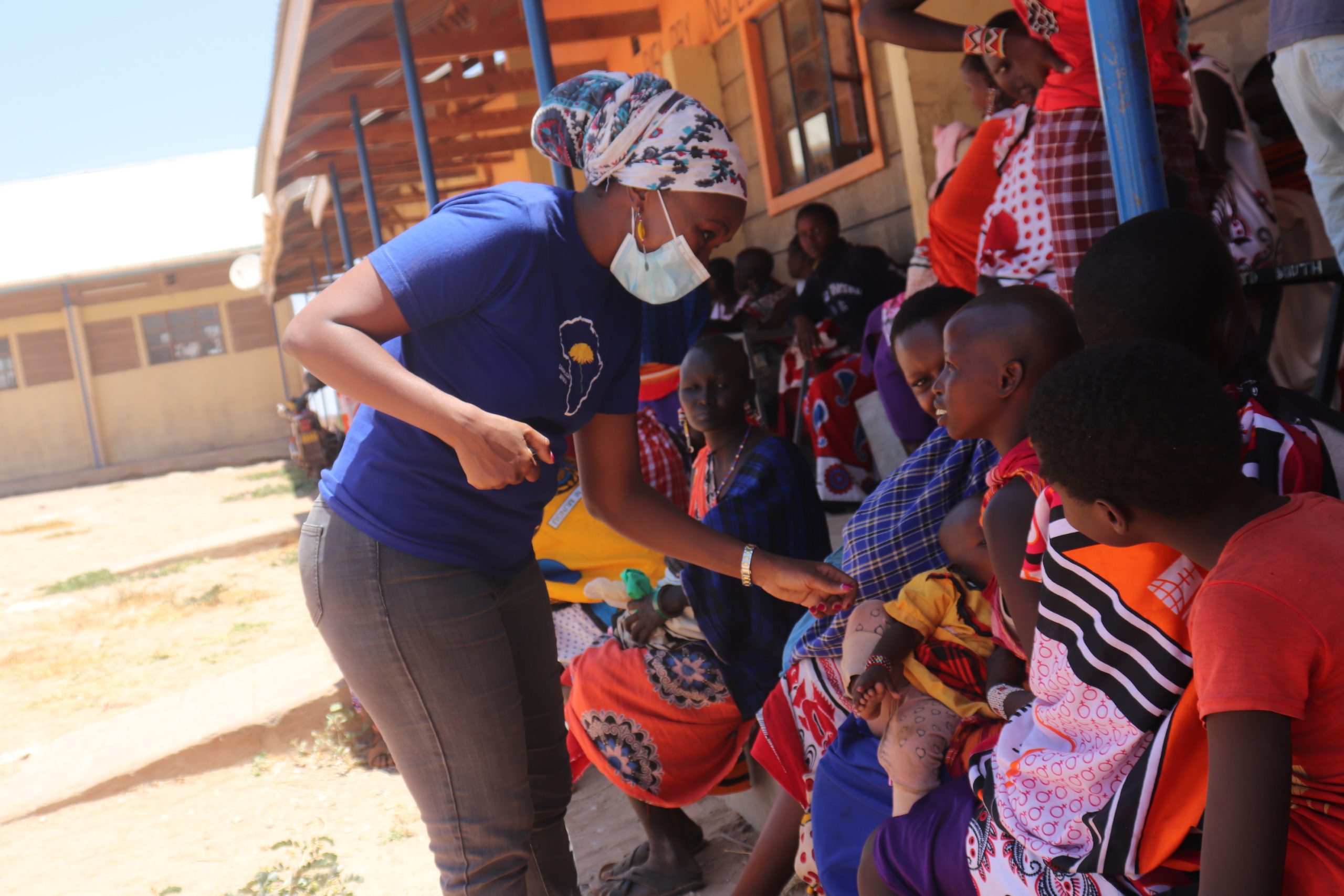
Image credit: African Visionary Fund partner Dandelion Africa
The Fund’s funding practice
‘Everything that we do has to be in service of African-led organisation,’ Bunten-Wamaru said.
That ethos has defined every choice the Fund has made, include the big one: to disburse all its grants as multi-year general operating support – the holy grail of funding. A study from the Center for Effective Philanthropy last year found that while attitudes have begun to shift in the funding world when it comes to core funding, practices have not. Almost 60 per cent of foundation CEOs report that their foundations provide some multi-year GOS grants, but only for a few of their grantees. Only 11 per cent of funders provide multi-year GOS to more than half their grantees.
This figure drops even more precipitously when mapped across race. In the U.S., Black-led organisations get 76 per cent less unrestricted funding than those led by their white peers. There isn’t research looking at this in Africa, but ‘I’m sure it is exponentially worse on the African continent’ Bunten-Wamaru said.
‘I’ve looked at the budgets of organisations that we’ve considered in our selection process where 98 per cent of their funding is restricted. It gives you the feeling of being in this straitjacket, of knowing what you want to do as an organisation and how to invest in your team and your growth and in innovation and in systems change, and you can’t do any of it because you’re dealing with all of this restricted funding,’ she said.
It’s also about recognising that the groups doing the work know more than those funding it.
It clicked that the odds were stacked against me as an African leader, compared to Western-led organisations that were doing similar work. It was very clear that this was a systemic problem.
‘The organisations we fund are the experts in the work they do and should have the freedom to use the funds in areas they believe are important. When funds are restricted, the money ends up being spent in areas that the funder thinks are important. When you’re earmarking funds, it’s almost like borrowed money for the grantees, because the funders are giving you the money but they’re not letting you make the decisions on how to use it. For us that’s problematic. Because then our job is not just as a funder, we’re then trying to be supervisors – and that’s not what we’re here for,’ Worku said.
Unrestricted funding has numerous benefits for the funder, as well as the grantee, something that sometimes escapes the conversation.
‘It’s actually much easier to do,’ Bunten-Wamaru said. ‘You get to know the whole organisation a lot better when you’re funding the entire organisation and building a relationship with them without this back and forth about budget lines getting in the way of building that trust-based relationship. It’s a more efficient use of funders’ staff time to build relationships with an organisation where you’re not spending half of the grant relationship clarifying tiny little things about a restricted grant.’
In addition to making their funds easier to use, the African Visionary Fund has also tried to remove as many barriers from the application process as it can. For grantees seeking funds, they don’t have to put together any new documents; instead, they’re asked to share any organisational documents they already have, like strategic plans or monitoring and evaluation frameworks, and a favourite grant application they’ve sent to another funder. The idea is that grantees don’t need to spend time creating anything new, but the Fund still has a chance to see an example of a time when the organisation articulated their work the way they wanted to. The Fund also tried to build relationships with the Executive Director or CEO, as well as team members and board members, to get a sense of the organisation from multiple viewpoints.
Instead of ‘creating some bespoke application’ Bunten-Wamaru said, ‘we found that between conversations and existing organisational documents, we could really get to know them quite well without having to ask anything.’

African Visionary Fund partner Shule Direct
Looking ahead
As the Fund hits the midway point of its current cycle (they are planning to raise $10 million by 2023, with an aim to support 35 organisations), Worku and Bunten-Wamaru reflected on what the future could hold for the African Visionary Fund.
‘We do want to raise another fund when we’re done with this one, probably much larger. We don’t want to be forever restricted to only nonprofit funding, but we’re not exploring anything else yet,’ Worku said.
When pressed on what going beyond nonprofit funding might look like, Worku said that it is not something they’re currently working through, but maybe ‘organisations that are hybrids of nonprofit and social enterprise, things like that.’
The future of development is not top down, it’s not Global North led. It’s so clear where this sector is going, and where it needs to go.
And then: ‘It’s about really exploring what other ways can our funding be impactful and helpful.’
While the team has ideas already in place for future funding rounds, both highlight how they hope their work is not just bringing in funds but changing attitudes about how foundations should be funding in general.
‘We also really want to work on inequity in funding – so funder education and raising more awareness around what funders have to change in order to make this an equitable relationship,’ Worku said.
For her part, Bunten-Wamaru reflected: ‘I think that 2020 was such an interesting time to start the fund. It feels like the conversation in the sector, at least from my perspective and I hope this is broadly true, has moved past the phase of us needing to make the case of why, it feels like everyone really acknowledges that equity is important, proximity matters, funding local leaders is the way of the future. But everyone’s getting tripped up on the how.’
The African Visionary Fund offers some promising early signs of how to do it better.
Elika Roohi is Digital Editor at Alliance.



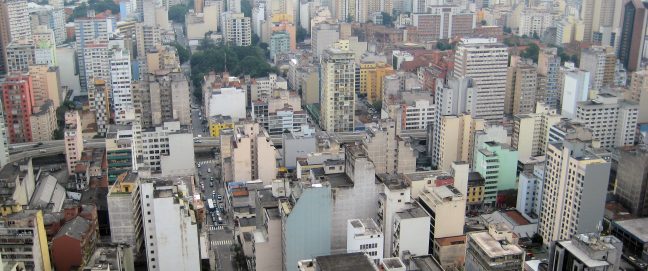

Comments (4)
Now that the application forms didn't open for us to send our proposals, would you kindly make it easier to open and extend the call time for us to enjoy the level ground?
I have gone through a wonderful and clear perception of funding African Visionary leaders. Thank you for that. However, I would wish you made it easier to apply by filling a form and getting a response.
Good initiative indeed. How do I edit my already submitted application?
As much as Philanthropy is still mainly white centric, when you talk about African led, that means those born on the African continent and that means it includes white people and people of mixed blood. Unless of course you wish to discriminate and if you control the funds, that is your prerogative.